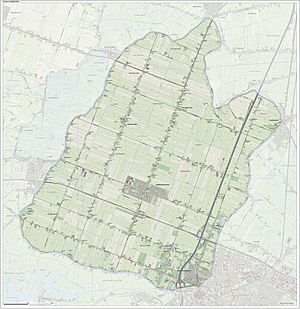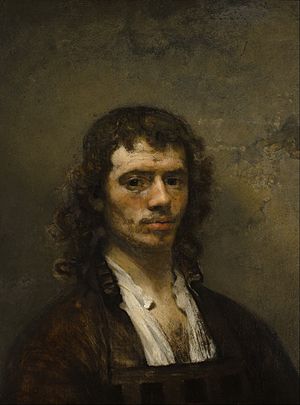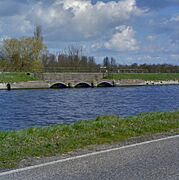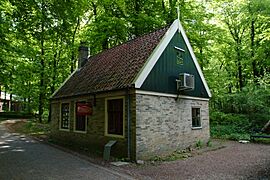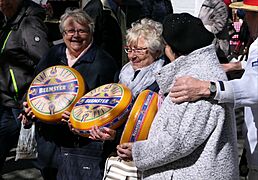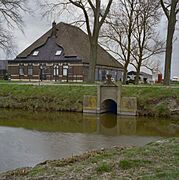Beemster facts for kids
Quick facts for kids
Beemster
|
|||
|---|---|---|---|
|
Former municipality
|
|||
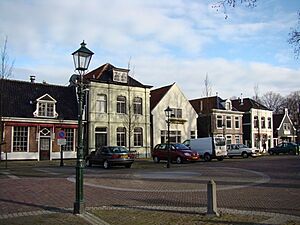
Middenbeemster town centre
|
|||
|
|||
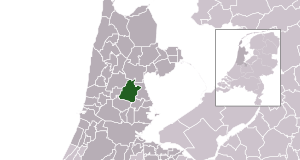
Location of the former municipality of Beemster in North Holland
|
|||
| Country | Netherlands | ||
| Province | North Holland | ||
| Municipality | Purmerend | ||
| Area | |||
| • Total | 72.07 km2 (27.83 sq mi) | ||
| • Land | 70.58 km2 (27.25 sq mi) | ||
| • Water | 1.49 km2 (0.58 sq mi) | ||
| Elevation | −4 m (−13.1 ft) | ||
| Population
(May 2014)
|
|||
| • Total | 8,926 | ||
| • Density | 126/km2 (330/sq mi) | ||
| Time zone | UTC+1 (CET) | ||
| • Summer (DST) | UTC+2 (CEST) | ||
| Postcode |
1460–1464
|
||
| Area code | 0299 | ||
| UNESCO World Heritage Site | |||
| Official name | Droogmakerij de Beemster (Beemster Polder) | ||
| Criteria | Cultural: i, ii, iv | ||
| Inscription | 1999 (23rd Session) | ||
Beemster is a special place in the Netherlands, located in the province of North Holland. It used to be its own municipality (a type of local government area). Beemster is famous for being the very first polder in the Netherlands. A polder is land that has been reclaimed from water.
The Beemster polder was created by draining a large lake using windmills. This amazing project happened between 1609 and 1612. Even today, the original, well-organized layout of fields, roads, canals, and dikes is still perfectly preserved. This unique design makes Beemster a very important historical site.
On January 1, 2022, Beemster joined with the nearby municipality of Purmerend.
Contents
Towns and Villages in Beemster
The former municipality of Beemster included several small towns and villages. These communities are part of the polder's history.
- Middenbeemster
- Noordbeemster
- Westbeemster
- Zuidoostbeemster.
History of Beemster
Around the year 800 AD, the area where Beemster is now was covered in peat. Peat is a type of soil made from decayed plants. The name "Beemster" comes from "Bamestra," which was a small river in the area.
How a River Became a Lake
Between 1150 and 1250, people started digging for peat. Also, big storms caused floods. These two things made the small Bamestra river grow into a large inland sea, a lake connected to the Zuiderzee.
Draining the Lake
Around 1605, some private investors decided to drain the Beemster lake. By 1610, they were almost finished. However, the lake refilled because of a break in the dikes of the Zuiderzee. The investors decided to build the main dike one meter higher than the surrounding land. In 1612, the polder was finally dry. The new land was then divided among the investors.
Farming and Success
In the early days, farmers used this new land to grow crops. These crops were important for long sea journeys by the VOC to places like the East Indies. The farmland was so good that the project was a big economic success. This was different from some other polder projects.
Beemster Cheese
The Beemster polder is also home to CONO Kaasmakers. This company makes the famous Beemster brand of cheeses. It started in 1901 as a co-op, meaning farmers worked together. They wanted to make cheese using milk from cows raised in the Beemster polder. Today, Beemster Cheese is sold all over the world.
Beemster as a World Heritage Site
The Beemster polder is a very special place. Because of its important history and how well its original design is kept, it was added to the UNESCO World Heritage Site list in 1999. This means it's recognized as a place of great value to all of humanity.
Why Beemster is a World Heritage Site
UNESCO gave specific reasons for including Beemster:
- Creative Planning: The Beemster Polder is a masterpiece of smart planning. It shows how old ideas about design were used to create a new landscape from water.
- Lasting Impact: The clever design of the Beemster Polder greatly influenced other land reclamation projects. Its ideas spread across Europe and beyond.
- Human-Water Relationship: Creating the Beemster Polder was a big step forward in how people managed water. It happened during a time when society and the economy were growing fast.
Two World Heritage Sites in One
The Beemster Polder also has five old fortresses. These forts are part of the Stelling van Amsterdam, which is another UNESCO World Heritage Site. This means Beemster Polder combines two UNESCO World Heritage Sites in one area!
Notable People from Beemster
Many interesting people have come from Beemster over the years.
- Carel Fabritius (1622–1654): A famous Dutch painter, born in Middenbeemster.
- Barent Fabritius (1624–1673): Also a Dutch painter, and Carel's brother.
- Johannes Fabritius (1636–ca.1693): Another Dutch Golden Age painter from the same family.
- Nanne Zwiep (1894–1942): A pastor of the Dutch Reformed Church.
- Harry Droog (born 1944): A Dutch rower who competed in the 1968 Summer Olympics.
- Erik Postma (1953–2002): A Dutch politician who served as Mayor of Beemster from 1998.
Gallery
See also
 In Spanish: Beemster para niños
In Spanish: Beemster para niños
 | Isaac Myers |
 | D. Hamilton Jackson |
 | A. Philip Randolph |




